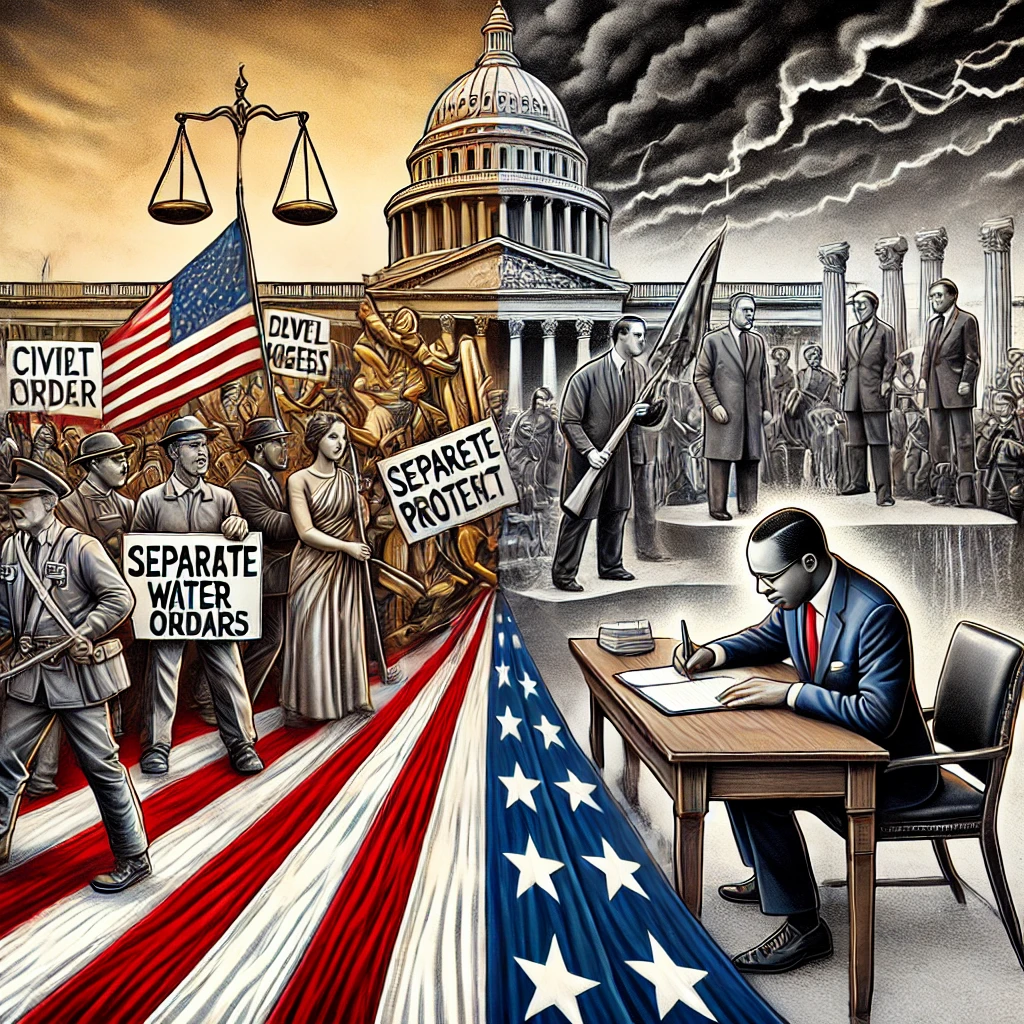By: D. Uchenna Constitution Journal
In a move that has both perplexed and alarmed many, President Donald Trump recently signed an executive order undoing a crucial policy put in place by President Lyndon B. Johnson in 1965. This executive order removes the requirement for federal contractors to ensure the integration of their workplaces, a mandate that previously prohibited segregation in facilities funded by taxpayer dollars. While Trump’s action may appear as a political maneuver, its implications stretch far beyond mere symbolism—representing, perhaps, a far more profound shift in the nation’s political and moral landscape.
The General Services Administration (GSA) issued a memo last month alerting federal agencies that Trump’s order now absolves contractors from the responsibility of ensuring the integration of workspaces, including the abolition of segregated dining areas for Black and white employees. Despite the fact that state and federal laws still outlaw segregation, many legal experts see this as a dangerous departure from a tradition of governmental oversight that has historically sought to heal the scars of systemic racial injustice.
Professor Melissa Murray, a constitutional law expert at New York University, spoke to NPR about the significance of this shift. While she acknowledged that the order is symbolic, she emphasized the weight of its symbolism: “It’s incredibly meaningful in its symbolism,” she said, underscoring that this reversal is a step back into a past where racial segregation was legally tolerated. The legal framework established in the 1950s and 1960s, which helped dismantle segregation, is now at odds with the current trajectory under this administration.
In stark contrast to the egalitarian ideals championed by the Civil Rights Act of 1964, which explicitly prohibited discrimination based on race, color, religion, sex, or national origin, Trump’s executive order signals a disturbing abandonment of those ideals in favor of a more laissez-faire approach to race relations. This is particularly troubling when viewed through the lens of libertarian philosophy, which asserts that the government’s role is not to regulate personal behavior but to protect individual rights. However, this executive order arguably does the opposite—potentially opening the door to an erosion of the civil rights protections hard-won by previous generations.
Under the Federal Acquisition Regulation (FAR), businesses that secure federal contracts were once required to uphold the prohibition of segregated facilities. Trump’s order removes these clauses from the requirements for federal contractors, creating an environment where companies doing business with the U.S. government may no longer be held to the same anti-discrimination standards. The ACLU has decried this move as a direct attack on decades of federal anti-discrimination policy, calling it “undermining obligations dating back to the Johnson administration.”
Despite the changes ushered in by Trump’s executive order, businesses in the U.S. remain subject to the Civil Rights Act of 1964, which still bans segregation and discrimination in employment and public accommodations. This creates a significant legal conundrum, as companies now find themselves in a position where federal regulations are in conflict with the longstanding mandates of the Civil Rights Act. As such, any disputes between these two bodies of law are likely to be settled in court, raising the possibility of a protracted legal battle.
Already, agencies like the Department of Commerce, the Department of Homeland Security, and the National Institutes of Health (NIH) have been tasked with implementing the changes outlined in Trump’s executive order. The NIH recently issued a notice clarifying that provisions such as the “Prohibition of Segregated Facilities” and “Equal Opportunity” clauses would no longer be considered when making decisions about federal contracts. This marks a significant departure from previous policy, where businesses were not only required to provide integrated facilities but were also expected to adhere to anti-discrimination standards that were rooted in civil rights legislation.
Libertarians, while proponents of minimal government intervention, typically advocate for a government that ensures equal protection under the law for all citizens, regardless of race or background. From this standpoint, Trump’s executive order represents a dangerous departure from the principles of fairness and equality, creating a government that may, in its deregulation of civil rights standards, inadvertently pave the way for future discrimination. This order sends a troubling message to federal contractors and private entities alike: that the state’s commitment to enforcing anti-discrimination policies is waning.
The ACLU’s condemnation of the executive order also highlighted its broader implications for social equity: “The executive order is not only undoing decades of federal anti-discrimination policy, spanning Democratic and Republican administrations alike, but it also marshals federal enforcement agencies to bully both private and government entities into abandoning legal efforts to promote equity and remedy systemic discrimination.”
In an era when global interconnectedness and the fight for social justice are paramount, the international ramifications of such a policy cannot be overstated. The U.S. has long been a beacon for civil rights progress, and any retreat from those standards sends a dangerous message to the world. As the world watches, the Trump administration’s actions may be viewed not just as a domestic policy shift, but as a signal of the nation’s decreasing commitment to combating systemic racism and promoting civil rights for all.
This executive order, like many of the policies put forward by the current administration, reflects an ideological shift that can only be described as an erosion of foundational democratic values. We are witnessing the slow, deliberate unraveling of decades of hard-won social progress, with consequences that are likely to echo across borders and generations.



